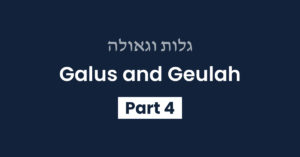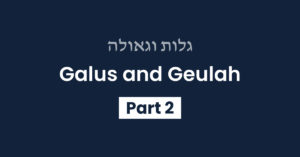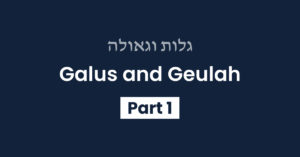For the past few weeks, we have been focusing on concepts related to Galus and Geulah. So far, we have discussed 2 messages Hashem wants us to learn from our time in Galus:
First, we considered how the second Bais Hamikdash was destroyed due to Sinas Chinam, and how the remedy for this problem is when we stop having the mindset of a “taker” – and instead have the mindset of a “giver.” The more we think of ourselves as “givers” and look for opportunities to help and care for others, the sooner we will eradicate Sinas Chinam from our midst.
Next, we explained how another challenge we are meant to overcome in Galus is that Hashem is trying to see: Will we remain separate from the other nations? Or will we be tempted to blend into our non-Jewish neighbors, adopt their values and culture, and let our own pure Jewish values fall to the wayside? Every step we take to remain separate from the non-Jewish nations brings us one step closer to our Ultimate Geulah.
This week, let’s take a look at another goal we are supposed to be pursuing in Galus, and that is: revealing Hashem’s Presence wherever He is hidden.
Remembering Better Days
In the times of the Beis Hamikdash, Hashem’s Presence was fully revealed. As the Mishna1 relates, there were many open miracles in the Beis Hamikdash: The holy meat never spoiled. No fly was ever seen in the slaughterhouse. The rains did not extinguish the fire on the Mizbeiach. And there was always miraculously enough room for the Jewish people to bow down, even when they were naturally very crowded in a small space.
These were all open miracles that no one could deny or brush away as “natural” events. The only explanation was that Hashem must be doing them. In the times of the Beis Hamikdash, Hashem’s Presence was open, revealed, and obvious to everyone.
In the times of the Beis Hamikdash, Hashem’s Presence was open, revealed, and obvious to everyone.
But slowly, a very sad thing started to happen: The Jewish people began to serve idols.
When a person worships idols, they are acting in the complete opposite way of how Hashem wants human beings to act. How so? Because the entire purpose of this world is that everyone should recognize Hashem and give honor to Him because He is our King and our Creator. But when someone worships idols, they are causing Hashem’s Presence to be hidden. They are ignoring Hashem’s Presence and erroneously acting and thinking as if these simple pieces of wood and stone have power. They are forgetting that nothing can exist without Hashem’s help and that everything is dependent on Hashem in order to exist.
An idol worshipper thinks that in order to get what he wants, he should try to “appease” the idols… but he is allowing himself to forget and ignore the truth that nothing and nobody has any power except for Hashem.
If You Let Me Hide From You…
So what happens when Hashem’s beloved creations begin to think this way, and start turning to idols to ask for their needs? The passuk2 warns us: “Hasteir Asteer Panai Bayom Hahu” – Hashem “hides His Face” from us, so-to-speak, and throws us into exile.
This punishment of Galus is therefore “middah kineged middah” (measure for measure). Since we hid Hashem’s Presence from our awareness, by ignoring the truth of His existence and power and worshipping idols instead – Hashem followed along by further hiding His face from us and throwing us into exile.3
This punishment of Galus is therefore “middah kineged middah” (measure for measure).
Now, when we are in exile, we are dispersed among the nations and it is much harder for us to feel Hashem’s Presense. We no longer have the miracles in the Beis Hamikdash, and it is much harder for us to believe in Hashem.
Furthermore, when we are in Galus, we see many evil people who seem to be leading “successful” lives, and we see many righteous people who seem to be “failures” in many areas. It makes us wonder: Where is Hashem? Where is there any justice? Why isn’t Hashem intervening to make things fair, punish the evildoers and reward those who do good? How can Hashem be silent? Where did Hashem go? The experience of Galus is one long stretch of time when Hashem’s Presence is painfully hidden.
The experience of Galus is one long stretch of time when Hashem’s Presence is painfully hidden.
To get out of Galus, then, the solution is obvious. We must reverse the problem that got us into Galus in the first place. We have to do everything we can to reveal Hashem’s Presence in this world, and not, chas veshalom, ignore Him or deny His existence – as our Jewish ancestors did when they were thrown into Galus.
Revealing Hashem’s Presence Today
How do we accomplish this? We don’t have the temptation for idol worship today, so we don’t have the opportunity to overcome that temptation… but there are still numerous other methods we can use to reveal Hashem’s Presence in this world more and more.
Every time we say a bracha, we are acknowledging that this food was created by Hashem and didn’t just magically grow from the ground. Every time we shake a Lulav, refrain from violating the Shabbos, or do any other mitzvah, we are giving testimony to the fact that there is a G-d who commanded me to follow His commandments. Every time we learn Torah, we are demonstrating our recognition that there is a G-d who has certain expectations from us, and we care to learn what He wants from us by learning His Torah.
The more we take steps to reveal Hashem’s Presence in this world, the more we will show Hashem that we have learned the message of Galus and want to notice His Presence. This will reverse the problem that originally got us into Galus, when the Jewish people ignored Hashem’s Presence and unfortunately began serving idols. Every time that we make an effort to give recognition to and honor to Hashem, we are bringing this world one step closer to fulfilling its ultimate purpose, and one step closer to our Ultimate Geulah.4
Sources: [1] Pirkei Avos 5:5; [2] Devarim 31:18; [3] Akeidah Devarim 31:18; [4] Akeidah Devarim 31:18;
Your Challenge
Once a day, do something to acknowledge Hashem’s Presence or power in this world – to reverse the problem of Hashem’s “hiddenness” that we are experiencing in Galus today.
FOR EXAMPLE:
- Say a bracha while thinking about how Hashem created your food.
- Refrain from saying lashon hara while thinking about how there is a G-d who cares about what you say.
- Do any mitzvah while thinking about how you are doing this because Hashem commanded you to do so.
- Daven to Hashem to help you with something – which shows that you know Hashem is the #1 place to address all your worries and concerns.
Torah Questions
- According to Devarim 4:29, what will the Jewish people do after they go into exile and start serving idols?
- According to Vayikra 20:22, what must the Jewish People do in order to avoid becoming exiled from the Land of Israel?
- When the Jewish people were in exile in Egypt, Hashem told Moshe to go to the Jewish people and tell them that they would soon be freed. Hashem told Moshe that he should refer to Him with the name “Ehkeh Asher Ehkeh.” What message was Hashem trying to tell the Jewish people by appearing to them with that name? (See Rashi on Shemos 3:14 or Brachos 9b)
- According to Rabbi Eliezer in the Gemara (Pesachim 87b), why did Hashem put us in galus?
- The Gemara (Sukkah 52b) says that there are 4 things that Hashem created, but then regretted that He created them. They are: Exile, the Kasdim, the Ishmaelites, and ____?
Questions to Ponder
- The Gemara says that galus is one of the 4 things that Hashem regrets that He created. What do you think this? How could it be that Hashem regrets anything that He did, if Hashem knows everything so He knew in advance that galus would be bad?
- The Gemara says that we can see how much Hashem loves the Jewish people by the fact that Hashem is with us in exile, no matter where we go. Do you feel this is comforting? What does it mean that Hashem is “with us” in exile – isn’t Hashem always present everywhere?
- The Gemara says that there is no greater Bittul Torah (waste of time from Torah study) than that of Galus. What do you think this means? How does Galus cause Bittul Torah?





